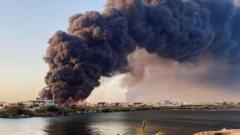Following the overthrow of Bashar al-Assad, Saudi Arabia and the U.A.E. face challenges in engaging with Syria's Islamist-led government.
Saudi Arabia and UAE Navigate New Landscape in Post-Assad Syria

Saudi Arabia and UAE Navigate New Landscape in Post-Assad Syria
The Gulf monarchies exercise caution as they assess the implications of a new regime in Damascus.
As the political landscape in Syria shifts dramatically after the fall of Bashar al-Assad, the Gulf monarchies of Saudi Arabia and the United Arab Emirates are adjusting their strategies to the emerging power dynamics. Traditionally, these nations have dealt with Syria as a close ally of Iran, which historically held sway in the region. However, with Iran's influence diminished following the Assad regime's collapse, there is room for the Gulf Arab states to establish new relations with the new leadership in Damascus.
Saudi Arabia and the U.A.E. are proceeding cautiously, particularly due to their historical opposition to Islamist factions in the Middle East. The main rebel faction controlling large areas of Syria has ties to Islamism and previously to Al Qaeda, raising red flags in Riyadh and Abu Dhabi, which have spent years counteracting political Islam represented by groups like the Islamic State and the Muslim Brotherhood.
The two states have made it clear that their future political and economic support hinges on the new Syrian leaders demonstrating an inclusive approach and fostering tolerance towards Syria's diverse sects. Anwar Gargash, the diplomatic advisor to the Emirati president, expressed concerns regarding the affiliation of these rebels with extremist organizations.
Hence, as Saudi Arabia and the U.A.E. plan their next steps in Syria, they will need to balance their historical stances against political Islam with the new realities in the region, potentially recalibrating their foreign policies in a post-Assad Syria while remaining vigilant of Islamist influences.
Saudi Arabia and the U.A.E. are proceeding cautiously, particularly due to their historical opposition to Islamist factions in the Middle East. The main rebel faction controlling large areas of Syria has ties to Islamism and previously to Al Qaeda, raising red flags in Riyadh and Abu Dhabi, which have spent years counteracting political Islam represented by groups like the Islamic State and the Muslim Brotherhood.
The two states have made it clear that their future political and economic support hinges on the new Syrian leaders demonstrating an inclusive approach and fostering tolerance towards Syria's diverse sects. Anwar Gargash, the diplomatic advisor to the Emirati president, expressed concerns regarding the affiliation of these rebels with extremist organizations.
Hence, as Saudi Arabia and the U.A.E. plan their next steps in Syria, they will need to balance their historical stances against political Islam with the new realities in the region, potentially recalibrating their foreign policies in a post-Assad Syria while remaining vigilant of Islamist influences.



















